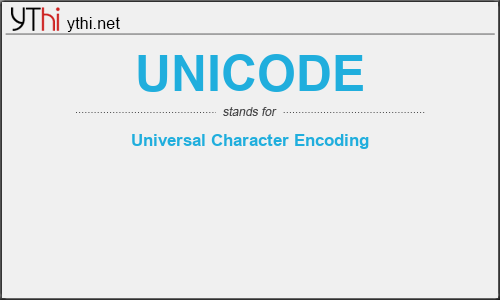What does UNICODE mean? What is the full form of UNICODE?
The Full Form of UNICODE is Universal Character Encoding.
Unicode is a universal character set, ie. a standard that defines, in one place, all the characters needed for writing the majority of living languages in use on computers. It aims to be, and to a large extent already is, a superset of all other character sets that have been encoded.
Text in a computer or on the Web is composed of characters. Characters represent letters of the alphabet, punctuation, or other symbols.
In the past, different organizations have assembled different sets of characters and created encodings for them – one set may cover just Latin-based Western European languages (excluding EU countries such as Bulgaria or Greece), another may cover a particular Far Eastern language (such as Japanese), others may be one of many sets devised in a rather ad hoc way for representing another language somewhere in the world.
Unfortunately, you can’t guarantee that your application will support all encodings, nor that a given encoding will support all your needs for representing a given language. In addition, it is usually impossible to combine different encodings on the same Web page or in a database, so it is usually very difficult to support multilingual pages using ‘legacy’ approaches to encoding.
The Unicode Consortium provides a large, single character set that aims to include all the characters needed for any writing system in the world, including ancient scripts (such as Cuneiform, Gothic and Egyptian Hieroglyphs). It is now fundamental to the architecture of the Web and operating systems, and is supported by all major web browsers and applications. The Unicode Standard also describes properties and algorithms for working with characters.
This approach makes it much easier to deal with multilingual pages or systems, and provides much better coverage of your needs than most traditional encoding systems.
UNICODE
means
Universal Character Encoding![]()
Translate Universal Character Encoding to other language.


Leave a Reply
You must be logged in to post a comment.